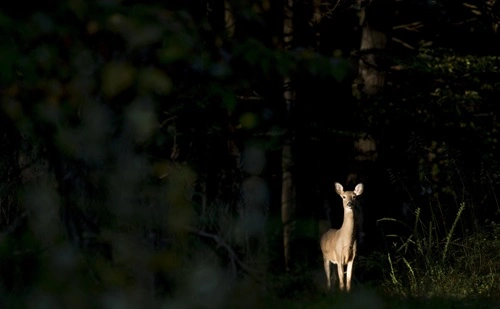Yes, in many states, it is illegal to spotlight deer even without a gun, as spotlighting is considered a form of harassment to wildlife and is heavily regulated. While specific laws vary by state, spotlighting—or using artificial light to illuminate wildlife—is often prohibited or restricted to prevent poaching and protect wildlife from undue stress.
What Is Spotlighting?
Spotlighting involves using a flashlight, vehicle headlights, or other artificial light sources to illuminate wildlife, typically at night. This practice is often associated with poaching because the bright light can disorient animals, making them easier targets for illegal hunters.
Legal Framework for Spotlighting
Federal Regulations
While there are no federal laws specifically addressing spotlighting, general wildlife protections under the Lacey Act prohibit activities that harm or harass wildlife in violation of state or tribal laws. Therefore, spotlighting is regulated primarily at the state level.
State Laws on Spotlighting
Many states explicitly ban or restrict spotlighting, regardless of whether a gun is present. Here are some examples:
1. California:
- The use of artificial light to locate wildlife is prohibited under California Fish and Game Code Section 2005, regardless of whether hunting equipment is present.
- Exceptions exist for landowners spotlighting on their private property to protect crops or livestock.
2. Texas:
- Spotlighting is illegal under Texas Parks and Wildlife Code if it is used to harass or disturb wildlife.
- Hunting with artificial light is banned unless it pertains to certain non-game animals like feral hogs, but even non-hunting spotlighting is restricted in many cases.
3. Florida:
- Spotlighting is prohibited under state law as it is considered harassment of wildlife, even without firearms present.
4. Pennsylvania:
- Spotlighting is restricted to specific hours (typically until 11 p.m.), and it is illegal during certain times of the year, such as hunting seasons, to prevent poaching.
Intent Matters
In most states, the intent behind spotlighting is key. If a person is caught shining a light on wildlife but is not in possession of a weapon, they may still face penalties if it appears they are harassing or attempting to disturb the animals. The law assumes that spotlighting at night is often linked to illegal hunting or poaching activities.
Penalties for Illegal Spotlighting
Violating spotlighting laws can result in:
1. Fines:
- Penalties can range from $100 to several thousand dollars depending on the state and whether wildlife was harmed.
2. Seizure of Equipment:
- Vehicles, lights, or other equipment used in the violation may be confiscated.
3. Criminal Charges:
- Spotlighting may result in misdemeanor or felony charges if wildlife is harmed or if the act violates broader anti-poaching laws.
4. Suspension of Hunting Privileges:
- Even if no firearm is present, engaging in illegal spotlighting can lead to suspension of hunting or fishing licenses.
Exceptions to Spotlighting Laws
1. Private Property:
Many states allow landowners to use artificial lights to protect crops or livestock on their own property.
2. Educational or Scientific Use:
Researchers or wildlife managers with proper permits may use artificial light for conservation or study purposes.
3. Non-Wildlife Areas:
Spotlighting in non-wildlife areas, such as shining a light on private property for non-hunting purposes, may be legal depending on the circumstances.
Why Spotlighting Is Regulated
The prohibition of spotlighting serves several purposes:
1. Wildlife Protection: Repeated exposure to bright lights can disorient or stress animals, potentially affecting their behavior and habitats.
2. Poaching Prevention: Spotlighting is commonly associated with illegal hunting, and restricting its use helps authorities combat poaching.
3. Fair Chase Principles: Ethical hunting laws prioritize fair chase, where animals are given a reasonable opportunity to evade hunters.
Recent Updates and Cases
1. Texas, 2023:
- Authorities issued fines to individuals caught spotlighting deer on public land, even though they had no firearms. The violators claimed they were “just observing,” but their actions violated anti-harassment laws.
2. Florida, 2024:
- A court upheld a fine against a group who used vehicle headlights to spotlight deer near a state park. The lack of weapons did not exempt them from penalties.
3. California, 2024:
- Conservation officers emphasized stricter enforcement of spotlighting restrictions during hunting season to deter poaching activities.
Common FAQs
Q1. Can I use a flashlight to observe deer at night on my property?
Ans: Yes, but only in states where private land spotlighting is permitted. However, harassment of wildlife, even unintentionally, can still lead to penalties.
Q2. Is spotlighting illegal if I’m not hunting?
Ans: In most states, spotlighting is still illegal if it harasses wildlife or violates anti-poaching laws, even without hunting equipment.
Q3. What is the penalty for spotlighting in restricted areas?
Ans: Penalties vary but typically include fines ranging from $100 to $1,000, equipment confiscation, and possible suspension of hunting licenses.
Q4. Are there exceptions for spotlighting?
Ans: Exceptions include using lights for protecting livestock on private property or for scientific research with proper permits.
Q5. Why is spotlighting regulated even without hunting?
Ans: Spotlighting can harm wildlife by causing stress or altering their behavior, and it is often linked to illegal poaching.

